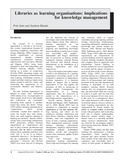Please use this identifier to cite or link to this item:
http://hdl.handle.net/10311/751Full metadata record
| DC Field | Value | Language |
|---|---|---|
| dc.contributor.author | Jain, P. | - |
| dc.contributor.author | Mutula, S. | - |
| dc.date.accessioned | 2011-03-15T09:44:05Z | - |
| dc.date.available | 2011-03-15T09:44:05Z | - |
| dc.date.issued | 2008 | - |
| dc.identifier.citation | Jain, P. & Mutula, S. (2008) Libraries as learning organisations: implications for knowledge management, Library Hi Tech News, No. 8, pp. 10-14 | en_US |
| dc.identifier.issn | 0741-9058 | - |
| dc.identifier.uri | http://hdl.handle.net/10311/751 | - |
| dc.description.abstract | The concept of a learning organisation is relevant to all twenty-first century organisations because of increasing complexity, uncertainty and change (Malhotra, 1996). Libraries can benefit significantly as learning organisations through reducing complacency; continuous learning, improvement and innovation (Michael and Higgins, 2002); being better equipped to deal with independent and distance learning (Brophy, 2005); serving as a source of competition (Fowler, 1998); promoting inquiry and dialogue; encouraging collaboration and team learning; establishing systems to capture and share learning; empowering people toward a collective vision; and connecting the organisation to its environment (Watkins and Marsick,1993). | en_US |
| dc.language.iso | en | en_US |
| dc.publisher | Emerald | en_US |
| dc.subject | Libraries | en_US |
| dc.subject | Learning organisations | en_US |
| dc.subject | Knowledge management | en_US |
| dc.title | Libraries as learning organisations: implications for knowledge management | en_US |
| dc.type | Published Article | en_US |
| Appears in Collections: | Research articles (Dept of Library and Information Studies) | |
Files in This Item:
| File | Description | Size | Format | |
|---|---|---|---|---|
| Jain_LHTN_2008.pdf | 64.46 kB | Adobe PDF |  View/Open |
Items in DSpace are protected by copyright, with all rights reserved, unless otherwise indicated.
